Chemical warfare, how serving in Afghanistan left it's mental scars plus brainwashing to tweak belief systems.
In this episode
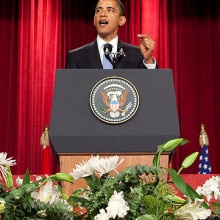
00:00 - The medal of honour
The medal of honour
with Ty Carter and President Barak Obama
Ty Carter, recipient of this years Medal of Honour, the United States of America's highest military decoration for his service in Afghanistan discussing his post traumatic stress disorder
The condition is highly stigmatised, as President Barak Obama recent ly highlighted.
ly highlighted.
Ty - Only those closest to me can see the scars that come from seeing good men take their last breath. During the battle, I lost some of the hearing in my left ear, but I will always hear the voice especially (soldier's name). I will hear his plea for help for the rest of my life.
Ladies and gentlemen, please, take the time to learn about the invisible wounds of war. Know that a soldier or veteran suffering from posttraumatic stress, know that they are not damaged. They're simply burning with living when others did not. More than half of us were wounded and almost everyone was left with a deep invisible wounds to their hearts and to their minds.
Hannah - The condition is highly stigmatised as President Barrack Obama recently highlighted.
Pres. Barrack - As we honour Ty's courage on the battlefield, I want to recognise his courage in the other battle he has fought, his struggle with posttraumatic stress. The flashbacks, the nightmares, the anxiety, the heartache that makes it sometimes almost impossible to get through a day. The pain of that day, I think Ty understands and we can only imagine, may never fully go away. It is absolutely critical for us to work with brave, young men like Ty to put an end to any stigma that keeps more folks from seeking help. So, let me say this clearly as I can to any of our troops or veterans who are watching and struggling. Look at this man. Look at this soldier. Look at this warrior. He's as tough as they come and if you can't find the courage and the strength to not only seek help but also to speak out about it, to take care of himself and to stay strong, then so can you. And as you summon that strength; our nation needs to keep summoning the commitment and the resources to make sure we're there when you reach out because nobody should ever suffer alone. And no one should ever die waiting for the mental healthcare that they need. That's unacceptable.
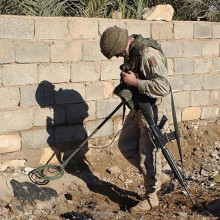
03:58 - Fighting post traumatic stress disorder
Fighting post traumatic stress disorder
with Captain Mark Lyndhurst, British Army, serving in Afghanistan
Captain Mark Lyndhurst served in Afghanistan and describes how the experience has left scars.
Mark - My name is Captain Mark Lyndhurst. I was serving in Afghanistan for 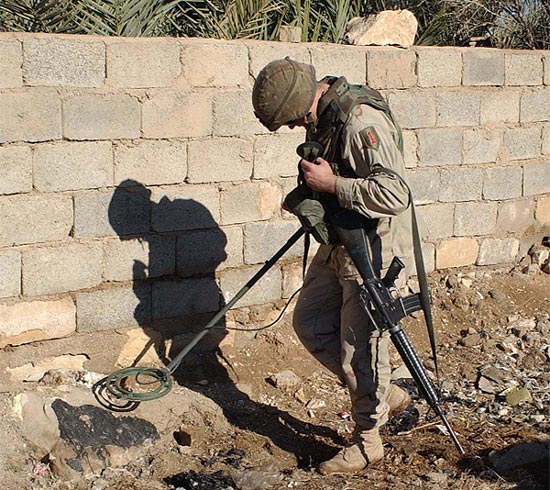 approximately seven months. The first five were relatively quiet: dealing with your usual explosion, shootings. About five months in I was involved in an explosion. We drove over what we think was a Russian antitank mine, largely saved by the soft sand that was beneath it and it blew a crater in the ground. I walked away largely physically unhurt. Everyone else walked away with some broken bones.
approximately seven months. The first five were relatively quiet: dealing with your usual explosion, shootings. About five months in I was involved in an explosion. We drove over what we think was a Russian antitank mine, largely saved by the soft sand that was beneath it and it blew a crater in the ground. I walked away largely physically unhurt. Everyone else walked away with some broken bones.
I came home and went back to Afghanistan after my leave and I got immediately flown to a place called Nad Ali where I was on the last transport to actually make it in there in about 7 weeks. It's just after I got in there the Taliban surrounded us cut off the position. And then we proceeded for the next 7 weeks to defend our position whilst the army was unable to come and rescue us.
There was people running out of food, running out of ammunition, we've got problems of water. We were under contact every day that we were there, things got so bad at one point that the RF refused to fly in because it was too high risk to them. So, they started dropping. Dropping all our supplies, we'd watch our supplies drift slowly towards the Taliban lines and then have to go out and fight for them.
And all through this, as a young officer, your duty is to do what you're told from above and also, to look after your soldiers. And that leaves you in the middle being under incredible pressure and incredibly alone because when soldiers look at you and go, "Boss, why are we doing this?" On some level, you've got to sympathise because you can't just tell them to shut up and get on with it because the situation is ridiculous. But on the other level, you need to come up with an answer and then come up with a reason that they follow you back our the gate the next day even though you know you're going to get shot up. Seven weeks of that. That's what left me with my PTSD.
It took just over a year before I was actually diagnosed with posttraumatic stress over which period of time the posttraumatic stress builds up and builds up, until it got to a critical point at which it was eventually noticed. The predominant symptom is, it's the obsessive thoughts, the continual re-thinking of the situation. It's been a lot therapy and talking because a lot of feelings that I was caught up and again, largely to do with the army, that there is a sense of fear when these things happen. And that's something that you feel particularly as the commander, you feel quite ashamed of because you think that you should be able to deal with things much better. And you know, that your priority is to actually put that aside and carry on. You've also got a set of very high standards to work that you go through when you do with this training back at home and you try and get everything as perfect as possible. But then the reality of it is when these things happen in war, the scenario isn't perfect. There are things you have to adapt to and there are many, many limitations that you can't really reconcile. And so, you're quite often left with this overarching feeling of, "I could've done better."
The army lives in this wonderful alpha male type world where it plays on machismo and ego and those are things that helps make it bold and strong and carry it through a lot of these times, and particularly allows you to lead. But sometimes it captures you there and you forget about the other side of things about emotion, about compassion, and the sort of the other parts that make up the human condition.
Hannah - And what kind of advice would you give anyone who is experiencing PTSD, whether they're in the military or otherwise?
Mark - There's only one thing which is just and it's the hardest thing to do. You need to talk to somebody. You just tell somebody.
My story is, when I came back, so to me every year to actually speak to anyone about things and that was largely through being pretty much frog marched to a doctor by some very close friends when it got to a point in time that it was beyond obvious that there was a problem.
But you're very concerned and caught up in yourself to the point actually that quite often; you don't really want to talk to other people about it. One, for fear that you're boring them because it's on your mind the whole time and two, because you're often living in this world of fear or guilt, or you're having problems reconciling your own thoughts. And they usually become confused because you relive these moments, the memory is an odd thing. You're not really remembering actually what was going on. Before you know it, you've remembered it so many times that it's become a confusion and a fantasy. You don't really feel justified in telling it to anyone because it's a very personal problem. But if you don't, it finds other ways to escape and people turn to alcohol, to drugs. And alcohol in particular, although to a certain degree, it quashes these thoughts, it also provides a vehicle for them to come alive and just express the emotions, the anger, the fear, and everything should come out.
In my case, I ended up with self harm and suicide attempts. So, once I started talking to the therapists, it was by no means a quick fix. I was in and out of therapy on a number of occasions. There's a lot of denial and I was very lucky to have a close support network of friends and family who sort of held my hand and kept me fighting and can help me find the help I needed.
You talk to a therapist and you work through the emotion and you rationalise the emotion as well to the extent, you look at things and go: "I was afraid. Is that okay?" And the answer is, "Well, yes."
I'm still, by no means cured. There's a lot of things, that still affect me now. Although possibly on the outside, you won't see them.
One thing that happens when I was in Afghanistan was that I was blown up a land rover. So, I was driving along to the dessert and hit an anti land mine. There was four of us in the vehicle. Three ended up being carried back to the UK and I walked away with a small cut to my left shin. I was in command of the vehicle and this left me very much questioning, what right I had to be alive. The next day, I was out patrolling again, so I haven't had the time to actually sit down and have a cup of tea and a fag and allow my mind and body to catch up with each other.
When we started doing my therapy with this technique that was used called EMDR which is a lot of the tapping and bits and bobs, and it's very close to hypnosis. Nobody seems to be able to understand or explain exactly what it does, but it's very good at changing acute thought patterns.
Now, a vehicle, when it gets blown up in the dessert, there is one smell that will stay with me for the rest of my life and it's this mix of tar and sand and diesel, and it's horrific and it stings at the back of your throat and it stings at the back of your nostrils. It's something that I could never really get rid of. But sometimes, if you're walking past like road works where there was bitchemen boiling, or tarmac boiling, it's that same acrid smell and something like that which will flick me back in an instant.
But the EMDR was something used in particular to tackle that one situation because it was so acute that we talked about the bad situation and then there's a sort of tapping going on and then we talked about good things. As far as I understand, what it does is it changes the neural pathway so that you were going bitchemen, explosion, "Good God! I'm nearly dead." Bitchemen explosion, "It's a nice day!"
Hannah - Thanks to Mark Lyndhurst. And Mark talked about EMDR, so eye movement desensitisation and reprocessing. This is a treatment that was developed by clinical psychologist, Dr. Francine Shapiro in the 1980s. It involves making side to side eye movements and listening to taps whilst recalling the traumatic incident before thinking of more positive thoughts.
It's thought that this left right eye movement stimulates the brain in a similar way to REM sleep, so rapid eye movement sleep when your eyes move rapidly from side to side. During this phase of sleep, memory reinforcement seems to happen. So, it's in this way that EMDR could've changed how Mark reacted to cues in the environment and stopped his flashbacks.

Can we prevent PTSD?
Amy - People who do go on to develop posttraumatic stress have some difference in their brains compared to those who don't develop PTSD. So for example, they tend to have a smaller hippocampus. Now, that's the structure that allows the memory to have a distinct time and place. So, that may mean that that trauma memory is not localised to a point in someone's past in a specific space and time, but that fear then becomes generalised to all situations and it persists in a way that it doesn't to people who don't develop PTSD.
We also know that areas like the amygdale, that's an area that's really important for storing the effective value of environmental cues. So, that would include fearful stimuli in the environment, fearful things and there also seems to be some differences in the ability of the prefrontal cortex which is an area that normally regulates all of these emotional processing. There appear to be some difference in those who develop posttraumatic stress as well.
The difficulty is that the bulk of this work is being done in human patients using structural brain imaging studies. But all of these of course happens post trauma. So, whether these differences existed before somebody was exposed to the traumatic event or whether they've developed afterwards is really difficult to disentangle. And what we don't have is a sort of a long term screening study for example in a rodent model where you can actually try to tease apart this correlation and know which way the causality runs.
Hannah - So, in that case, we can't really - as Kay asks, we can't neuroscience to screen and find out whether certain people might be more predisposed to experiencing posttraumatic stress disorder later on in life and therefore, shouldn't maybe be at the front line
Amy - We're not in a position where we can do that on an individual basis yet. So, we have risk factors, but they're very, very statistical. So for example, women are more likely to develop posttraumatic stress than men are, but that doesn't necessarily mean that we shouldn't let women into the army. You can make the same argument that men are more likely to become addicted to alcohol than women. Therefore, we shouldn't allow men into pubs. So, it's all very broad brush at the moment and there's no diagnostic screen. You couldn't scan someone's brain and say, "Based on this volume of these, how big these brain structures are, they shouldn't go on the front line." So, we can't do that yet.
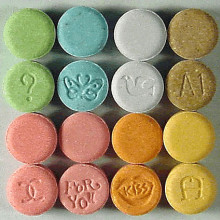
How does Ecstasy help treat PTSD?
Amy - So, MDMA which is also known as ecstasy. It's a very, very dirty drug that has a lot of different effects on the brain. A few of the things that it does is mainly to increase levels of particular chemicals - so, dopamine, noradrenalin, serotonin, and oxytocin. So, these are all modulatory chemicals in the brain that influence cognitive function in a very sort of diffuse way.
But certainly, dopamine and oxytocin have been linked to feeling attached to people and euphoria and feeling good about yourself.
MDMA used to treat posttraumatic stress: there has been some evidence that MDMA reduces the activity of the amygdala. So, that might be why MDMA appears to be effective in conjunction with psycho therapy which it ultimately reduce the activity of the amygdale.
Hannah - And that reduces that feeling of fear and anxiety?
Amy - Yes, exactly. So, the amygdala is really important. It's important for a number of different emotional memories, but in the case of PTSD for the storage of those fear memories.
Hannah - And Kimberly also asked, would dependency of MDMA be a concern, given the short term use for any military personnel or anyone suffering from PTSD?
Amy - So, that's a really good question. In the study, they used MDMA in conjunction with psycho therapy and they only gave three doses of MDMA.
So that, I would consider as being more like the doctors giving morphine in a hospital when somebody is in a lot of pain and we know that people who are given morphine for pain in a hospital don't tend to go out and seek heroine on the street. So, you wouldn't necessarily expect people who've been given MDMA during psychiatric treatment to necessarily go out and seek it themselves.
And anecdotally from that study, the authors comment that the patients really bought into the idea that it was enhancing the psycho therapy and wouldn't have thought of going and taking the drug in the absence of that psycho therapy. There's certainly no reason not to explore this as a potential therapeutic option.

17:42 - Honey trap
Honey trap
with Professor Frances Ashcroft, Oxford University
 Next we meet Professor Fran Ashcroft from Oxford University. She puts military neuroscience into historical context describing the first documented chemical warfare committed by the Greeks some 2300 years ago. Disrupting ion channels in nerve cells and affecting how these cells send messages in the brain and the body.
Next we meet Professor Fran Ashcroft from Oxford University. She puts military neuroscience into historical context describing the first documented chemical warfare committed by the Greeks some 2300 years ago. Disrupting ion channels in nerve cells and affecting how these cells send messages in the brain and the body.
Fran - All sorts of chemicals can interact with ion channels and there is one which is known as grayanotoxin which is found in the pollen of a certain species of rhododendron which is found on the Black Sea.
Its effects are best describe perhaps by Xenophon in 400 BC when he explains how his soldiers ate of the honey that was made from the pollen of these rhododendrons and found themselves with lots of diarrhoea and purging, and vomiting, and having convulsions. He has this marvellous phrase that they all lay on the ground in a state of great dejection.
Fortunately, they recovered and nothing really much happened for another 200 years until Pompey was invading that area. The Greeks remembered this story of Xenophon's and they collected the honey, and strewed it in the path of the oncoming troupes who ate it, were incapacitated and were then decapitated. So, this was perhaps one of the earliest forms of chemical warfare.
There's another coda to this story really and that is, that these days, of course the rhododendrons are still there, the honey is still produced by the local bees. The honeys blended in with many other honeys. So, the toxin is diluted out. But in that local area, you can actually get the honey that is made specifically from this particular species of rhododendron. It has a local vogue as an aphrodisiac which is rather unfortunate and there are even stories today of men who have taken some of these and ended up in a hospital rather acutely ill.
Hannah - Fran Ashcroft.

19:48 - Combating civilian chemical warfare
Combating civilian chemical warfare
with Dr David Jett, Director of the National Institute of Health, CounterACT Research
Hannah - Over the last 2000 years, many chemical weapons have been  developed from tear and mustard gas which were used during World War 1, to the more recent civilian sarin attacks including in Tokyo. I spoke to Dr. David Jett, Director of the National Institute of Health CounterACT Research Programme in America.
developed from tear and mustard gas which were used during World War 1, to the more recent civilian sarin attacks including in Tokyo. I spoke to Dr. David Jett, Director of the National Institute of Health CounterACT Research Programme in America.
David - In the '95 attack, there was a terrorist organisation called Aum Shinrikyo that released sarin nerve gas in the Tokyo subway. Thousands were exposed, resulted in many short and long term really debilitating effects and even 12 deaths. I think one of the most disturbing results of this attack, there are long lasting neurological and other kinds of effects showing up even today in some of these victims. We're concerned about reducing some of the long term kinds of effects.
Hannah - And there's been reports that even in the last few months of these gases being in Syria on civilians. So, how can you research into the type of thing that we can do to help protect people against such chemical warfare?
David - Yeah, so it turns out, we have a couple of drugs that are used that work pretty well for these types of compounds. We are developing more effective drugs that can fatalise, prevent some of the seizures and paralysis caused by these compounds by blocking receptors within the body and so forth. There's been some reports that some of the physicians that treated folks in Syria themselves got sick and some even died because some of the off gassing from the victims. And so, that's so that's another concern on how are we going to decontaminate, not only a site and also some of the victims so that medical personnel can treat them.
Hannah - Scientists, if they are developing a chemical that's used as a pesticide for example and then it turns out that somebody starts using it in warfare to kill people - civilians. How much do you think science should be accountable for this type of thing and is there anything that a research scientist should be aware of, should have to take some responsibility for?
David - Yes, that's an excellent question and in fact, that's what happened with our organophosphorus nerve agents that a scientist was working on these as pesticides. Once they found out that they're very toxic to humans, under the - this is during World War II under the German military - developed these into even more toxic nerve agents.
What we have in place at least here in the US is, we have lots of policies under what we call Dual Use Research. When you are working on something like a very toxic chemical or a very potent biological agent that could be developed into some sort of chemical weapon you have to be very, very careful about how you conduct that research and the time and information you disseminate about that research.
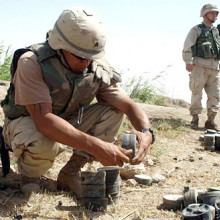
22:52 - Enhancing the army with neuroscience?
Enhancing the army with neuroscience?
with Professor Rod Flowers at the Barts Medical School London
Hannah - We've heard how neurochemicals can be used as weapons against the enemy, but can neuroscience be used to enhance the mental fortitude of soldiers and the fighting force on the ground. Professor Rod Flowers at Barts Medical School London chaired a Royal Society steering committee looking into this.
Rod - We identified some research for example which suggested it may be 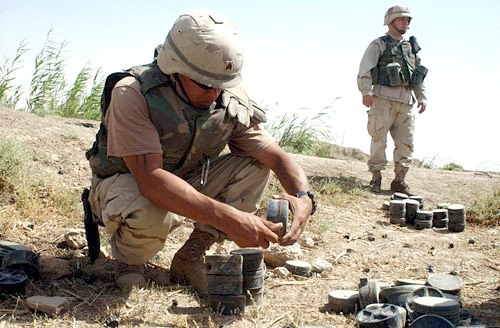 used to screen, recruit, to identify those people who are say, for example are reacting under stress or have a particular cognitive skill set which at the moment has to be sort of teased out through quite intensive screening.
used to screen, recruit, to identify those people who are say, for example are reacting under stress or have a particular cognitive skill set which at the moment has to be sort of teased out through quite intensive screening.
We identified ways in which the cognitive performance of military personnel could be increased and one obvious example, I suppose, is the use of cognitive enhancing drugs. I mean, these have used for many, many years actually.
Even pilots in the Korean war used to use methamphetamines to prevent them from getting fatigued and keep them alert and awake. And of course, these days, we have much more sophisticated agents that enable you to do this. It's not just that, but also, having to have your troop sleep is actually a major problem in the field. So, if you could discover drugs that can keep your troops awake for a bit longer and enable them to perform competently then actually, this is a major advantage to you.
It might be possible to use EEG techniques on people who are observers. For example, people who are looking at lots of satellite images because it turns out that the brain often recognises differences between photographs and images, even if these differences don't make conscious awareness as it were. Picked up by measuring what's called P-wave in the brain. You can use this technique actually to speedup recognition for example of changes in satellite photographs of let's say, missile positions or something.
I suppose the other thing I could add is there's some evidence now that direct brain stimulation techniques may be used to improve speed learning. If you look on the web then see, you can build these things yourself from a 9 Volt battery and some wires and so on. I'm not recommending for any of your listeners actually to do that, but nonetheless, there have been some academic studies showing that brain stimulation does improve learning.
So, those were some of the handful of things that we found out that actually might improve the efficiency of armed forces.
Hannah - Thanks to Rod Flowers.

25:36 - The science of brainwashing
The science of brainwashing
with Dr Kathleen Taylor from Oxford University.
 Hannah - What about using psychology findings to control the thoughts of the opposition? The word "brainwashing" was coined over 70 years ago. During the Korean war, American soldiers in Chinese prisoner of war camps came home communists, denouncing the American way of life - an apparent reversal of their beliefs. To find out about the science of "brainwashing", I caught up with Dr. Kathleen Taylor from Oxford University.
Hannah - What about using psychology findings to control the thoughts of the opposition? The word "brainwashing" was coined over 70 years ago. During the Korean war, American soldiers in Chinese prisoner of war camps came home communists, denouncing the American way of life - an apparent reversal of their beliefs. To find out about the science of "brainwashing", I caught up with Dr. Kathleen Taylor from Oxford University.
Kathleen - The whole idea of brainwashing is really contested. This is not some kind of magical weird process. It's just this basic application of psychology and neuroscience only taken to very extremes. Because it's very coercive, you don't get people doing brainwashing research, at least not in reputable institutions. So, there is no field of brainwashing research, that's the first point.
However, neuroscience is making some progress in understanding the kinds of changes that might take place in the brain when somebody is put in that kind of very stressful situation. So for example, the US military has done research looking at the effects of stress on the brain and looking at stress hormones and how they affect particularly pre-frontal areas because I think the essence of a quote, unquote brainwashing situation is when somebody is very, very highly stressed. They're put under an awful lot of pressure and that pressure might be emotional abuse, it might be lack of sleep, it might be forced to do repetitive behaviours, it might be isolation from all the things that they know so they're kind of disoriented, and it might be that their inputs are controlled so that their entire reality is under somebody else's control. So, all of that is going to change the brain. Of course it is, everything changes the brain, but those allow the "brainwasher" to have much more control over what's actually going into the brain and obviously, what's going into the brain is to a certain extent, determining what is being thought by the brain and what is coming out in the terms of actions and behaviours.
So, you see for example that in cults, the once that exert the most bizarre control, the ones that really seem to be able to make people do very extreme things are the ones that are very isolated and having a lot more control of the person's situation whereas cults like the Moonies, that people operate in society are much less extreme.
Hannah - What kind of implications are there for "brainwashing" in the world of politics?
Kathleen - I mean, there are loads, absolute loads. So for example, it is possible that as people develop more understanding of how beliefs changes happens in the brain that they want to use that in situations where you have people with beliefs that don't match yours and that raises huge political and ethical questions. So for example, you have the simple questions of who decides whose beliefs are okay and whose beliefs aren't. And then you have the whole ethical thing about whether changing somebody's belief is actually like treating them for a mental illness or whether it's like doing something else. I mean, there are really big questions about this. So, the whole idea of beliefs in politics and whether they can be changed and specifically, whether they can be changed artificially - I mean, people are really interested in working out how beliefs are based on how they're encoded in the brain. That's the first step to wanting to be able to change them and I mean, that's just one of the big issues that neuroscience is going to raise increasingly in the next years and decades. It's one of the biggest.
Hannah - And I'm afraid that's all we have time for this month. Thanks to Fran Ashcroft, David Jett, Rod Flowers, Kathleen Taylor, Mark Lyndhurst, Ty Carter, Barrack Obama, and Amy Milton.
- Previous World Toilet Day
- Next Why do I overlook the obvious?










Comments
Add a comment